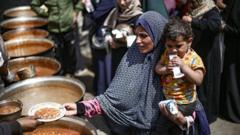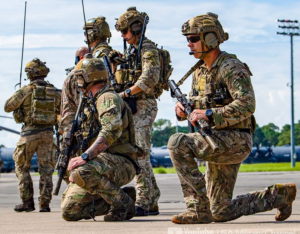After 18 months of being held by Hamas, Omri Miran's family grapples with the dual challenges of waiting for his return while trying to maintain a semblance of normalcy. On his birthday, his wife, Lishay, reflects on their life and shares her unwavering belief in his survival despite the turbulent circumstances, urging society not to forget those still missing.
The Unwavering Hope of a Wife Waiting for Her Husband's Return Amidst Captivity

The Unwavering Hope of a Wife Waiting for Her Husband's Return Amidst Captivity
As her husband Omri Miran marks his 48th birthday in captivity, Lishay expresses her longing and hope through heartfelt messages, highlighting the emotional turmoil faced by families of hostages.
As Omri Miran celebrates his 48th birthday in captivity, his wife, Lishay, continues to send messages through their shared WhatsApp account, reflecting the emotional burden of living without him for 18 months. Captured by Hamas on October 7, 2023, while at their home in Kibbutz Nahal Oz, Lishay began her correspondence just weeks after his abduction. The chat is titled “Notes to Omri,” filled with updates and heartfelt sentiments, revealing the stark reality of a family life interrupted.
On his birthday, she reminisces about their daughters, who were mere children when he was taken. Lishay voices the struggle of maintaining hope, stating, "You know, Pesach is the holiday of freedom." The juxtaposition of this cultural observance against the backdrop of her husband’s absence paints a poignant picture of captivity and longing for liberation.
Gatherings in Tel Aviv's Hostages Square mark this difficult occasion, with Lishay's messages symbolizing resistance against the silence that often blankets the stories of hostages. Posters expressing support and calls for Omri's release highlight the emotional and political stakes intertwined in the ongoing conflict, drawing attention to the plight of others still being held captive.
Despite the grim conditions in Gaza and the recent resurgence of violence, Lishay remains hopeful. Although she harbors frustrations towards the government regarding perceived inaction, she refrains from casting blame. The recent diplomatic references to Omri's dual citizenship only deepen her sense of loss and individuality for her husband, as she insists, "Omri has a name. He's not just a hostage."
The hope for a ceasefire remains palpable but uncertain. Lishay recalls the anxiety of war returning to her bordering kibbutz, prompting her to visit and feel a closer connection to Omri, even as she grapples with the overwhelming reality of their situation. With messages still waiting to be read, she clings to the possibility that one day, the gray ticks indicating unread messages will turn blue, signaling her husband's return. In the meantime, Lishay signifies the collective pain of families waiting, ensuring their stories and struggles remain visible amidst the silence of captivity.




















